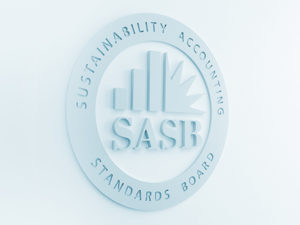By Gabriella Vozza

I spent the last six months having conversations with senior corporate leaders in the retail and consumer goods industry as part of SASB’s process to develop industry sustainability standards. I gained an insight into the current state of corporate sustainability – how far it’s come in this sector, and how far it still needs to go. Here are three themes that emerged:
- Supply chain has come a long way, but has a long way to go
Arguably most of the environmental and social impacts in retail lie in its supply chain – the manufacturing of consumer goods. These include issues like labour practices and safety conditions in factories, air pollution from manufacturing, chemical discharge into waterways, deforestation for leather production, and water stress in areas where cotton is grown. The Rana Plaza building collapse in 2013 and human rights abuses linked to seafood sold at major retailers are a couple examples of the importance of these factors today.
Companies are working together and have come a long way in managing these issues. However, there still is no industry consensus around how they disclose their progress on these issues, and many companies still don’t know their full list of raw materials suppliers, opening themselves to risk. When you browse the websites and annual reports of consumer goods companies, you’ll notice that companies discuss the same topics, such as factory audits, but use different metrics and definitions. Some companies report the number of suppliers they audited, some report the number of audits, and some have their own rating system for violations. While their work should be commended, it is still difficult to make sense of how the industry is moving forward.
- Sustainability data is not integrated into financial reporting processes
During the consultation conversations, I heard many companies acknowledge the importance of material sustainability issues to their business’ success. The link between sustainability and financial performance can be seen in recent incidents like Chipotle’s 2015 foodborne illness outbreak, Wells Fargo’s 2016 unauthorised accounts scandal, and Valeant Pharmaceutical’s drug pricing policies that contributed to an 87 percent decrease in its stock price.
However, I repeatedly heard companies express the challenges they face with gathering and reporting sustainability data in time to integrate it into financial filings. The problem is that sustainability data is typically collected and reported months after the company’s financial filings are published. Further, it is not typically verified with the same rigor as financial data is. Because these sustainability issues are vital to company performance, this information needs the level of rigor given to financial reports, so investors can evaluate companies with the full set of information that is material to company performance.
- Accountability in an evolving world
Just this week Target resolved its 2013 data breach for $18.5 million – the largest multi-state data breach settlement in history.
In the wake of continued high-profile attacks, consumers are becoming more educated about the threat of cyber crime. Further, as the methods and tools of cyber criminals continue to evolve, data security will become increasingly important for companies to keep or gain market share. This is an opportunity for the most trusted brands to position themselves favourably in the eyes of consumers.
But when you look at company financial filings, most are not providing detailed information on how they are preventing incidents from occurring in the future. Companies already acknowledge the importance of data security – in fact 100% of the top 10 companies in the retail and e-commerce industries already disclose information about data security in their Form 10-Ks, but in vague language and with few quantitative indicators related to performance. This lack of quality disclosure does not reassure customers that their data is safe, and prevents investors from understanding who will perform best in the long term.
Where to go from here
Sustainability issues in retail like data security, raw materials sourcing, and chemical content of products are complex. SASB has developed metrics for companies to use when discussing sustainability in their annual reports to investors, and it actively seeks input from market players to make sure they are useful for decision-making. The next opportunity to provide feedback will be during a public comment period this summer.
